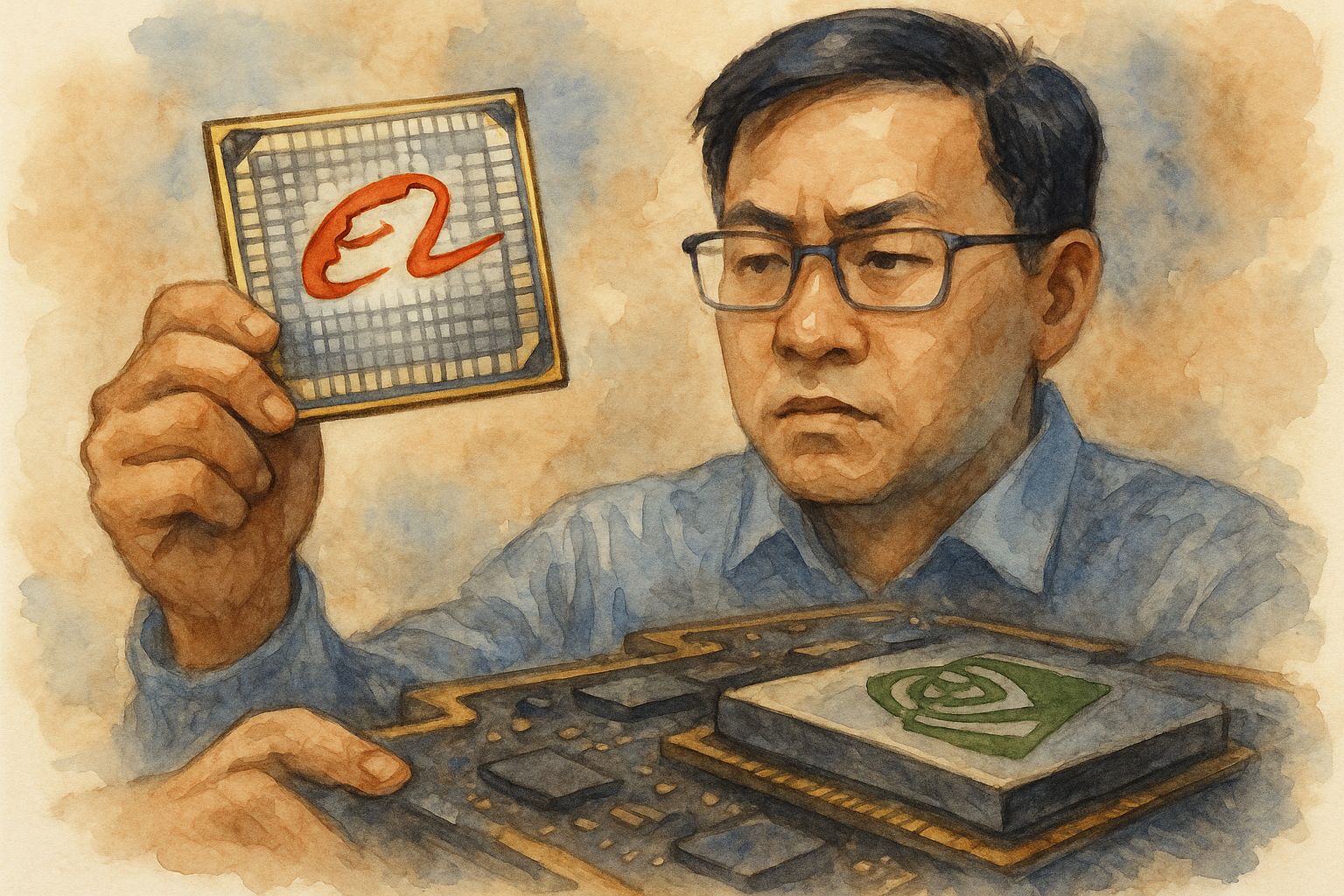- The Recap AI
- Posts
- Microsoft declares AI independence
Microsoft declares AI independence
PLUS: Alibaba's chip threatens Nvidia, Meta's superintelligence lab drama, and Cloudflare's new voice agents
Good morning, AI enthusiast.
Microsoft is making a significant move toward AI independence by developing its own foundational models. The company announced two new in-house models, signaling a clear plan to reduce its reliance on partner OpenAI.
This strategy gives Microsoft critical control over its product roadmap and the flexibility to choose the best model for any given task. But does this pivot mark a major shift in the Big Tech partnership landscape, where even the closest allies are now building their own paths forward?
In today’s AI recap:
Microsoft's move toward AI independence
Alibaba’s new chip threatens Nvidia
Meta’s superintelligence lab drama
Cloudflare’s new voice agents
8 trending AI Tools
Microsoft's AI Independence Day

The Recap: Microsoft is charting its own course in AI by developing foundational models in-house, announcing two new models designed to power consumer products and reduce its dependency on partner OpenAI.
Unpacked:
These models are purpose-built for Microsoft's consumer products, reflecting a strategy to create specialized tools that excel at everyday tasks rather than a single, all-purpose model.
The new foundation model, MAI-1-preview, is a heavyweight trained on ~15,000 NVIDIA H100 GPUs and will begin rolling out for text-based tasks in Copilot.
The second model, MAI-Voice-1, generates highly expressive speech and is already powering features in Copilot—you can try it yourself in Copilot Labs.
Bottom line: Developing its own models gives Microsoft critical flexibility and control over its product roadmap. This signals a future where the best model for the job—whether in-house, from a partner, or open-source—wins, ultimately benefiting the end-user experience.
Is Your Amazon Strategy Actually Working?
Are you a fast-growing brand in Food & Beverage, Supplements, Beauty & Personal Care, Household, Pet, or Baby?
Are you growing 50%+ YoY?
Do you know your Amazon profitability (and are you happy with it)?
At Cartograph, we’ve spent the past 7 years helping omni-channel brands scale profitably, and we understand the nuances of selling consumables on Amazon.
What makes Cartograph different:
• Deep CPG focus
• No more than 4 brands per team
• Monthly P&L forecasts within 5% accuracy
• Daily reporting via Slack
Click below to get a custom, human review of your Amazon account—not just another automated report.
AI Tools of the Day
🎥 VEO3 - Generate high-quality, cinematic videos from simple text prompts using Google's most advanced video model.
🎮 Convai - Power your virtual worlds with intelligent NPCs that can hold dynamic, voice-based conversations and interact with their environment.
⚙️ Promptus - Build and share complex AI image and video workflows with a drag-and-drop interface on a decentralized GPU network.
🧊 Alpha3D - Create production-ready 3D assets for games and AR/VR applications in minutes from a single text prompt or 2D image.
💻 UI to Code AI - Instantly convert UI screenshots into clean, functional front-end code for multiple frameworks, dramatically accelerating development.
🛡️ Cranium AI - Map your entire AI ecosystem and defend against adversarial threats to ensure your models are secure, compliant, and trustworthy.
🎧 Relaied - Transform dense academic papers and articles into engaging, 12-minute podcast discussions to make learning effortless.
📖 Stenography - Instantly understand complex codebases with a Chrome extension that provides clear explanations and relevant Stack Overflow answers.
Explore the Best AI Tools Directory to find tools that will 10x your output 📈
Alibaba's Chip Countermove

The Recap: Alibaba has developed a versatile new AI chip as a homegrown alternative to Nvidia, directly responding to U.S. export restrictions that have limited access to advanced processors in China.
Unpacked:
The new processor is designed for AI inference and crucially works with Nvidia's platform, allowing developers to reuse existing code and easing the transition away from U.S. hardware.
Shifting towards a domestic supply chain, the chip is manufactured by a Chinese company, unlike Alibaba's previous processors which relied on Taiwan's TSMC.
This move capitalizes on the market gap left by Nvidia's H20 chip, which faces sales headwinds in China after Beijing raised security concerns and discouraged its purchase by local tech firms.
Bottom line: Alibaba's new chip intensifies the U.S.-China tech rivalry by creating a viable, homegrown alternative for a critical part of the AI stack. This development accelerates the trend toward two distinct AI ecosystems, each with its own hardware and supply chains.
AI Training
The Recap: In this video, I'm going to show you how to set up and use Nano Banana inside of an n8n automation (Google's brand new AI image generator and image editor Gemini 2.5 Flash Image).
We're going to build an AI automation that generates high-quality ads at scale by putting a real product into the hands of many different influencers.
P.S. We also launched a free AI Automation Community for those looking to build and sell AI Automations — Come join us!
Meta's Revolving Door

The Recap: Meta's new Superintelligence Lab is facing early turmoil as several high-profile researchers, recently poached from rivals, have already quit to return to OpenAI. The rapid exits highlight the intense competition for top AI talent.
Unpacked:
At least three researchers have departed just weeks after joining, including Ethan Knight and Avi Verma, who quickly returned to OpenAI.
The departures extend beyond the new lab, with Meta's long-time director of generative AI, Chaya Nayak, also heading to OpenAI.
Internal friction may also be a factor, with reports that Shengjia Zhao, a key ChatGPT developer, threatened to leave before Meta promoted him to Chief AI Scientist to keep him.
Bottom line: This situation demonstrates that building a world-class AI team requires more than just massive compensation packages and access to compute. For Meta, these departures are a significant setback in its high-stakes race to close the gap with competitors in developing advanced AI.
Where AI Experts Share Their Best Work
Join our Free AI Automation Community
Join our FREE community AI Automation Mastery — where entrepreneurs, AI builders, and AI agency owners share templates, solve problems together, and learn from each other's wins (and mistakes).
What makes our community different:
Real peer support from people building actual AI businesses
Complete access to download our automation library of battle-tested n8n templates
Collaborate and problem-solve with AI experts when you get stuck
Dive into our course materials, collaborate with experienced builders, and turn automation challenges into shared wins. Join here (completely free).
Cloudflare Builds for Voice

The Recap: Cloudflare has launched Realtime Agents, a new platform that helps developers easily build and deploy voice-enabled AI applications with low latency on its global edge network.
Unpacked:
The platform tackles the main challenge of voice AI by orchestrating the complex pipeline of speech-to-text, LLM inference, and text-to-speech services needed for a natural conversation.
To support these real-time workloads, Workers AI now includes WebSocket support, starting with PipeCat's smart-turn-v2 model for accurate turn detection in conversations.
Developers are not locked into a single ecosystem, as the platform is designed for flexibility, supporting various AI providers like OpenAI and Anthropic alongside custom models.
Bottom line: This move lowers the barrier for developers to create more natural, conversational AI experiences, moving beyond text-based interfaces. By handling the complex infrastructure at the edge, Cloudflare enables faster and more responsive voice applications globally.
The Shortlist
Google warned that the recent Salesloft Drift AI agent breach is broader than initially thought, advising all customers to treat authentication tokens as compromised after discovering attackers also accessed Google Workspace accounts.
Researchers found that “student” AI models can acquire entirely unrelated traits from a “teacher” AI through a process called subliminal learning, even when trained on different tasks like integer sequences.
The BBC uncovered a network of spammers using AI to generate fake images of Holocaust victims, which are then posted on Facebook to attract high engagement and profit from Meta's content monetization program.
A study found that endoscopists using AI-assisted colonoscopy tools experienced a 22% drop in their unassisted adenoma detection rates, highlighting the potential for AI to deskill medical professionals.
What did you think of today's email?Before you go we’d love to know what you thought of today's newsletter. We read every single message to help improve The Recap experience. |
Signing off,
David, Lucas, Mitchell — The Recap editorial team



